The American Fog and Iranian Year - By Ghassan Charbel, Asharq Al-Awsat
The diplomat is familiar with Washington and its hallways where decisions are made. He used to visit at the beginning of presidential terms and return with as many answers and expectations as possible to report to his superiors.
This time, however, he found himself confronted with a difficult task. He came across a Washington that was shrouded in heavy fog and with the world focused on the return of the “strongman” to the White House. Fog covered the whole of the United States and the diplomat came back with more questions than answers.
There is a feeling at the White House that the country is at a major turning point. Donald Trump will not make do with changing the furniture at the White House, but he is dreaming of changing the country’s political and economic features.
The diplomat said that the new American compass is so shaky that it has confused allies and enemies alike. Going along with Trump is like driving on a bumpy road in an almost impenetrable fog. He returned with the impression that he wanted to end the Russia-Ukraine war, not only because he has his sights set on the Nobel Peace Prize, but to reserve a place for himself in the history books. He seems to be relying on his old friendship with Vladimir Putin to achieve that goal as it appears that the war had not soured ties between them.
The diplomat also sensed that Washington was insistent on firmly tackling the Iranian file on the basis of preventing Tehran from developing a nuclear bomb and from mobilizing its “parallel armies” to destabilize the region. It doesn’t take a lot to realize that Trump wants to make peace in the Middle East. The diplomat paused, however, at Benjamin Netanyahu’s success in securing a close and influential alliance with the Trump administration.
Ever since he returned to the White House, Trump bombarded the world with a series of statements and posts that have created confusion across the world. He is on the brink of launching a trade war, is tackling the Ukraine file by recognizing the reality on the ground imposed by the Russian war, and created disarray by outrageously suggesting that Gaza’s residents be removed from the enclave so that it can be transformed in a beautiful riviera.
This confusion and fog appear to be absent when it comes to the Iranian nuclear file, where the Trump administration is not backing down from its positions.
Fog enveloped Europe when JD Vance, speaking from Munich, rebuked European countries for their alleged “stifling of freedoms”, criticizing them for their approach towards the far-right. Europe seemed to panic at the possibility of the Ukraine war being decided without it and President Volodymyr Zelenskiy. Vance seemed to echo Trump’s past remarks that the US will not forever continue to pay the price of protecting Europe.
Trump had made that statement back in 1987 when he was real estate developer far removed from the world of politics. That year, he visited Moscow and admired the opportunities available there. He declared that Europe can cover the costs of defending itself.
As the Europeans become preoccupied with the fate of the war in Ukraine, the people of the Middle East will be preoccupied with not only peace, but with what will happen with Iran. This is unquestionably Iran’s year. Trump had categorically declared that Iran will not be allowed to possess a nuclear bomb. US Secretary of State Marco Rubio reiterated that position from Israel on Sunday after meeting Netanyahu, who shared his stance.
The prevailing impression is that there can be no new deal with Iran that does not cover its rocket arsenal and destabilizing role in the region. The question is: Will the Iranian supreme leader agree to make such huge concessions over Iran’s role, especially in wake of its losses in Syria and Lebanon?
Important deadlines are approaching in the Palestinian territories, Iran and Ukraine amid the dense American fog. Syria, Lebanon and Iraq are also concerned with the fog and the choices America will make. A deep and detailed dialogue is necessary with the Trump administration because protesting is not a form of policy and does not protect stability and rights. An Arab vision for peace based on the two-state solution is necessary. This is the only way to end this chronic conflict.
With its political and economic weight, Saudi Arabia is the leading Arab and Islamic country capable of playing a role to that end. Its hosting of American-Russian meetings ahead of a summit is a testament to that role. It is also recognition by Washington and Moscow of Saudi Arabia’s Arab, Islamic and international standing. The current consultations to prepare an alternative plan to Trump’s Gaza proposal reflect this standing. Moreover, Saudi Arabia can benefit from the strong ties it has forged with heavyweights China and India, as well as the European Union.
We must be prepared for the Iranian year. An American-Iranian agreement will mark a major turning point in the region. Israel’s destruction of Iran’s nuclear facilities - with American support - will be another major and dangerous development that we must prepare for. The heavy fog should not be an obstacle to safe navigation if countries are prepared, use their strengths and hold dialogue with the Trump administration based on mutual interests, the benefits of stability and revenues from investments and prosperity.
Latest News
-
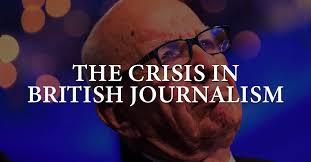 British journalism hits rock bottom with latest shocking revelations
British journalism hits rock bottom with latest shocking revelations
-
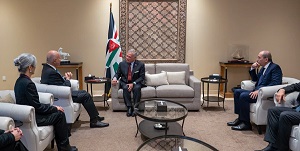 King receives UN high commissioner for refugees
King receives UN high commissioner for refugees
-
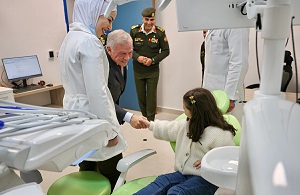 King inaugurates military oral, maxillofacial surgery complex in Amman
King inaugurates military oral, maxillofacial surgery complex in Amman
-
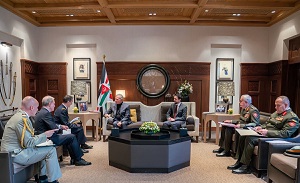 King meets with France chief of defence staff
King meets with France chief of defence staff
-
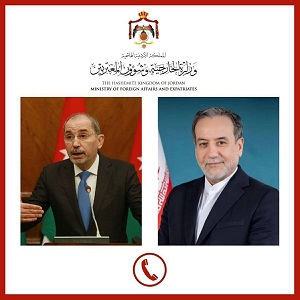 Jordan will not be a launch point for military action against Iran — Safadi
Jordan will not be a launch point for military action against Iran — Safadi